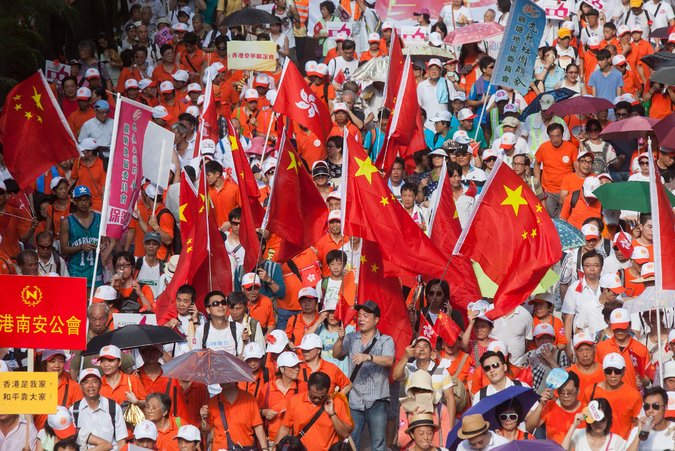
(Photo courtesy: Alex Hofford/European Pressphoto Agency)
(TibetanReview.net, Aug19, 2014) – As pro-democracy advocates in Hong Kong prepared to carry out their Occupy Central business district campaign to press their demands ahead of the 2017 election, China on Aug 17 put up its own show of anti-democratic force to oppose that campaign. Under the banner of Alliance for Peace and Democracy, tens of thousands of people marched under a blistering sun to express their opposition to the pro-democracy plan that threatens to bring Asia’s biggest financial center to a standstill if the government does not open up the nomination process for electing the city’s top leader, the Chief Executive.
Prearranged by some 1,500 pro-Beijing groups that included news media, state political advisers, different clan groups from China, an educator federation and industrial and retail sector organizations, the marchers donned different uniforms and held banners and placards identifying their organizations to express their opposition to the pro-democracy campaigners.
According to local media reports, some protesters were paid between HK$200 ($26) and HK$500 to join, while others received souvenirs, discounted or free lunch and transportation before joining the march, reported Kyodo News international Aug 17. It also said employees from some China-based companies were “enticed” by their superiors to join the march.
Nytimes.com Aug 17 cited Hong Kong’s police as saying 111,800 people left Victoria Park on Aug 17 for the march, more than the 98,600 they recorded on the Jul 1 march by the pro-democracy crowd. “Yet photographs taken at the peak points of both marches at the same location show many more people on the street for the Jul 1 event,” the report added. The report also said an independent count by Hong Kong University put the maximum number of participants on Aug 17 at 88,000, compared with a maximum of 172,000 for the Jul 1 rally.
The report also said that many, if not most, of the participants in the Aug 17 rally were born in mainland China, with most of them being organized into groups corresponding to Chinese hometowns, schools or, in some cases, employers, easily identifiable with their matching T-shirts and hats. It added that middle-aged and elderly people dominated this march, while young people dominated the Jul 1 march by the pro-democracy crowd.
In keeping with the provisions of Hong Kong’s 1997 mini constitution, which set the terms on which Britain handed over the island back to China at the end of a 100-year lease, China has promised that the people of the Special Administrative Region can elect its leader by universal suffrage by 2017. However, it has now made it clear that the new system to be installed must guarantee Beijing’s full control of the election outcome, including especially over the candidates for the election.
The democracy camp has been calling for an open, democratic nominating process and carried out an unofficial 10-day referendum on the issue in Jun 2014, which saw nearly 800,000 voters. According to BBC.com Jun 30, about 42% of voters backed a proposal allowing the public, a nominating committee, and political parties to name candidates for the top job. Some 88 percent of those who voted in the referendum have urged the city’s lawmakers to veto any political reform plans from Beijing that do not meet “international standards,” reported AFP Jun 30.
Organizers of the referendum threatened a mass sit-in in Hong Kong’s business district later this year unless authorities come up with acceptable electoral reforms.
The Standing Committee of the National People’s Congress in Beijing, the Chinese parliament, is to issue guidelines to the Hong Kong government on how it can write new election rules later this month.


